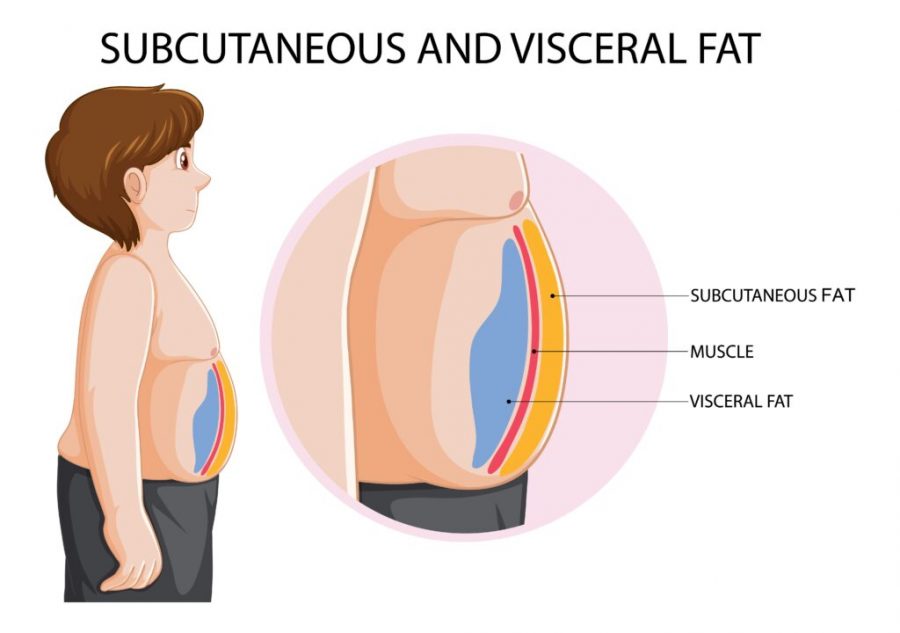Visceral fat: What is it?
Not all fat comes in a similar proportion. Some like visceral belly fat which simply fits and stays under your skin, keeping you cozy and warm, the real stubborn and troublemaker fat. It hides deep inside the abdomen, covering your organs like an unwelcome hug.
This “hidden” fat, as opposed to the fat you can compress, is biologically active and produces poisonous compounds that cause inflammation, interfere with hormones, and endanger your health.
Visceral v/s Subcutaneous Fat
Your body might store both the visceral and subcutaneous fat but the fact is they work very differently, Let’s understand- HOW?
Visceral fat, the type of fat that surrounds organs like the liver, pancreas, and intestines, is deep inside your abdomen. Because it is solid and doesn’t wobble, it provides the appearance of a hard, round belly (think “beer belly”).
Subcutaneous fat, which is the fat under your skin. It’s soft, pinchable, and mostly harmless, acting as insulation and energy storage. This fat is also stored in thighs or abdomen, you can squeeze and grab this fat easily.
Symptoms And Reasons For Visceral Belly Fat
Visceral Fat Symptoms
Although it’s not always easy to identify, visceral fat can be identified by the following symptoms:
A firm, bulging abdomen (even if you’re not overweight overall).
A larger waist (over 35 inches for women, over 40 inches for males).
Elevated blood sugar or cholesterol.
Brain fog, lethargy, being very lazy and low on energy.
Why Do People Get Visceral Fat?
Visceral fat tends to accumulate and is frequently brought on by:
A poor diet plan that includes fats, sugary food and drinks, processed carbs, all these items encourage the accumulation and storage of belly fat.
Sedentary Lifestyle: Actively movements and exercise is a very important factor to improve health and reduce fat, or else the fat is accumulated in the belly.
Excessive Alcohol: Alcohol consumption leads to increase in empty calories intake, rationally an individual should consume and breakdown the alcohol consumption level.
Stress and Sleep Deprivation: Due to stress, cortisol level in the human body increases, which in turn contributes to visceral fat in the belly.
Some individuals may get belly fat due to factors like genetics and hormones.
Testing and Diagnosis
Despite not being visible right away, visceral fat can be quantified using the methods listed below:
Waist Size: In case if your waist is –
larger than 40inches, probably increased belly fat in men
larger than 35inches, probably increased belly fat in women
Body Mass Index (BMI): A score of greater than 25 BMI, suggests that you have excess weight, although it is not ideal.
Waist-to-Hip Ratio: Divide your waist and hip sizes to determine the ratio. Any ratio above 0.9 for men and 0.85 for women is considered dangerous.
Body scans (CT, MRI, and DEXA): The most accurate methods are body scans (CT, MRI, and DEXA), albeit they are not always necessary and can be expensive.
Can Visceral Fat Be Removed
Great news- It’s easier to get rid of belly fat forever, but we have to understand the basics & follow:
Cut Back on Sugar and Processed Foods: Avoid soda, white bread, and fried foods.
Boost Your Consumption of Protein and Fiber: Foods that provide longer-lasting fullness include veggies, lentils, chicken, and eggs.
High-intensity interval training (HIIT) and strength training: They are efficient methods for rapidly burning visceral belly fat.
Increased sleep and stress management are linked to increased body fat.
Limit Alcohol – Less booze = fewer empty calories stored as fat.
Visceral fat begins to disappear after a few weeks of forming good preventative measures to lower the fat!
Foods That Contribute to Visceral Fat
White bread, pasta, and pastries
Sugary drinks (fruit juices, soda)
Fried meals & trans fats (fast food, margarine)
Alcohol (particularly beer and cocktails)
Too much dairy (ice cream, full-fat cheese)
Is This Fat and Surgery Related?
Absolutely! Excess visceral fat increases surgical risks by making:
Anesthesia is more difficult due to fat around organs.
Healing slower, increasing the risk of infection.
Heart complications are more likely post-surgery.
Effects Of Visceral Fat On Health
Heart Disease: Visceral fat boosts blood pressure and LDL (bad cholesterol).
Type 2 diabetes is three to five times more likely to develop in those with extra abdominal fat.
Alzheimer’s disease: Research has linked visceral fat to cognitive loss and brain shrinkage.
Cancer: An elevated probability of breast, colon, and pancreatic cancer.
It’s Time to Take Action
Belly fat is a quiet killer, despite the fact that it may seem like a troublesome part of aging.
The good news? You have the power to reverse it! Your body (and future self) will thank you if you start making little adjustments now, including eating better, exercising more, and getting better sleep.
The challenge: Take charge of your health by taking a waist measurement today!
Let’s combat visceral fat together!
The post Visceral Belly Fat: Symptoms, Reasons & Diagnosis appeared first on FitnessRobust.
